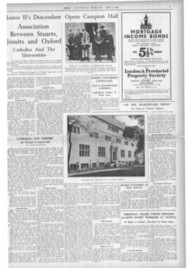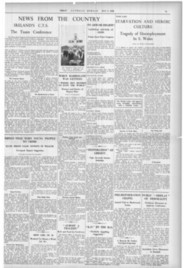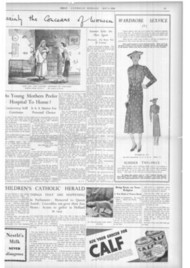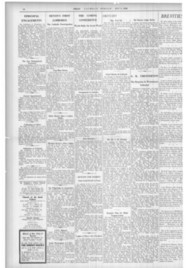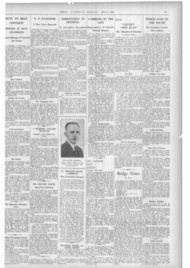Page 3, 3rd July 1936
Page 3

Report an error
Noticed an error on this page?If you've noticed an error in this article please click here to report it.
Tags
Share
Related articles
On The Other Side, The Statutes Of The University Of
Early Years Of St Edmund Campion
A Refreshing Voyage To The Dark Side
How Catholics Returned To Oxford
Dazzling Elizabethan Who Laughed At The Gallows
CATHOLICS AND OXFORD
The Meaning of Campion Hall
MARTINDALE
Enough has been said about the social side of the opening of the new Campion Hall, and about its architecture. I have been asked briefly to indicate its educational ideal.
About 1890 it was realised by a few that the level and standard of Catholic higher education were very low. This was partly due to Catholics being naturally lovers of their own traditions; and, having been for so long excluded from sharing in the general life of the nation, and so, being unable to compare themselves with others.
Fr. R. P. Clarke, once a Fellow of St. John's College at Oxford, had been exiled thence because he became a Catholic. He resolved to return there, not in spite of being a Catholic, but because he was one.
With infinite difficulty the laity had received leave to go there, and to Cambridge.
It was his desire that some at least of the future Catholic clergy should obtain as wide a culture as the favoured laity 'did. It is always bad if a clergy be less well educated than those to whom they minister. So too thought the Benedictines; but I cannot here relate the history of St. Benet's Hall at Oxford.
Fr. Clarke, then, resolved to open a " private hall " for young Jesuit students at Oxford.
Such Halls existed, but were not part of the University; were financial experiments which died with the death or disappearance of their Head; were called by his name; and lay practically outside the current of University life. Still, that was all that could then be hoped for.
Hysterical Days
Oddly, opposition came mostly from Catholics. Why could not young Catholics be content with what their fathers had had? Anyone who went to Oxford was bound to apostatise! He was, too, bound to live in luxury and become a snob; and a snobbish priest is worse than any other kind of snob. And so on.
The Jesuit Hall began, then, in extreme poverty. Fr. Clarke indeed killed himself by earning money for its survival.
The students (lest lynx-eyed critics should suppose they were lazy) could take exercise only after dark. When they began to row, a devout layman denounced them to Rome for indecency— their stockings did not meet their shorts —a Naked Knee was visible. For a while they had to astound Oxford by going down to the river lankily black from waist to toe. A Jesuit fresher shocked yet other lay-nerves by putting the weight better than anyone else.
These hysterical days are, thank God, finished with. Nor, as a matter of fact, did anyone apostatise or even go modernist.
When I was sent there, Fr. O'Fallon Pope had taken over. He had been a very wealthy American, reputed to have gone sailing (in his undergraduate days) in boats ballasted with champagne bottles. He maintained, as before, a discipline of extreme austerity within the house; but cer tam n elegances became possible and the Hall became known more widely, though not always accurately. Thus an evening paper once announced that it was reserved for " Jesuits and the sons of Jesuits "—disconcerting my father not a little.
I returned to it as a priest, towards the end of the War, under Fr. Plater, who, he too, killed himself by his tripled work— university work, work among soldiers, and work for the C.S.G. But by then the Hall had made good.
It and the Benedictine Hall became integral parts of the University, a new statute creating " permanent private halls," able to bear their " personal " name. Thus Campion Hall came into existence cheek by jowl with the college where the Martyr had been the most brilliant scholar of his day.
But this house (most inconvenient anyway) was only leased. A new site had to be found, and it is where Sir Edwin Lutyen's beautiful simple dignified building now stands.
A Catholic Quarter
I may say that it, and the Chaplain's house where Fr. R. Knox lives hard by, are destined to change a whole quarter of Oxford which contains, even now, some most disgraceful slums. It wishes to share with the Benedictines, the Franciscans and Dominicans, the Salesians and a whole galaxy of convents, in a regenerative work that is far wider than just mugging up matter for examinations.
It may still be asked : " Why send men to Oxford or Cambridge, instead of to London, Leeds, or Cardiff?"
The answer is, first, that there are Catholics at those and many other universities. The next answer is, that probably more will go to the " provincial " universities, though not fewer, I hope, to the two ancient ones, because the all-round value of those provincial places is rising so rapidly.
The fact remains that even to-day nothing can compete with Oxford and Cambridge for beauty, for antiquity, for romance, and for world-renown. And though they are not nearly so rich as they were, they still can fill themselves with the very most competent professors: if you want to get what is first-rate, you can.
The tragedy is that among our more educated classes so few young men want anything in particular, and nothing very much. No less deplorable, and far more disgusting, is the mass of raw-minded young men who gravitate to universities and, before they know anything, undertake to teach others, especially about human nature and its destinies; and the girls are just as bad.
Yet these deserve, it seems to me, more sympathy than those who do not even imagine they could care about anything intensely, and certainly know or care for none of the masses of their fellow-men.
The future priest, so it seems to me, should, when by exception he gets the chance, understand the world in which he is to live and work as well as he possibly can, and have the best information, method of studying it, hints as to how to interpret it, at his disposal.
I cannot imagine anything better educated than the man who has all the material that Oxford can provide to work upon, and, his trained Catholic mind to do that work—a mind trained certainly in philosophy and, when possible, also in theology. He should outstrip everybody else. The Catholic Workers' College
I end by recalling that Oxford also contains the Catholic Workers' College, directed by Fr. L. O'Hea, and filled with students for whose maintenance men and women in Newcastle, Liverpool, London, are sacrificing needed halfpence. These students will go back to their work in hard conditions, equipped, please God, with trained minds able to compete with those others, trained or untrained, who preach atheist revolution among—I won't say, their fellow-workers, for the worst of such agi tators find it far easier to talk revolution than to do a minute's work with their hands or even heads.
Anyhow, let me not be supposed to have hymned the virtues of Campion Hall or its hopes without having done full-hearted homage to the Catholic Workers' College, which will never have a domicile built by Lutyens (though I think he would very much enjoy doing his utmost for such a place), and is far more likely, nowadays, to find intelligent dukes to open it than to find appreciation from the mass of our selfregarding Catholics.
Those present at Friday's opening included Fr. Ronald Knox (Catholic Chaplain to the University); Fr. L. 0. flea. S.J., M.A. (Principal of the Catholic Workers' College); Fr. C. C. Martindale, S.J., M.A.; Fr. J. Lopes (Eynsham); Pr. C. Lattey, S.J.; Fr. P. B. McConville, S.C. (Cowley); Fr. W. McMullin, Si. Superior of the Church of St. Aloysius); Fr. E. Helsham, S.J. (Rector of Heythrop College); Pr. Dunstan, 0.S.F.C., B.Litt. (Capuchin Superior in Oxford); 1'r. J. Rogers, 8.J.; Fr. P. Triggs, $.J.; Fr. Leslie Walker, 8.J., M.A.; Fr. J. J. Wellninth, S.J. Fr. W. Dempsey; Pr. Sutcliffe; Ft. Donnelly; Fr. Hilary Carpenter. 0.P. (Prior of Blackfriars); Dom Justin McCann, O.S.B. (Master of St. Benet's Hall); the Warden of lt.eble College and Mrs. Kidd; the Principal of Lady Margaret Hall; the Librarian of the Bodleian Library; the Rector. of Exeter College; the Provost of Worcester College and Mrs. Lys; the Principal of Hertford College; the Provost of the Queen's College; the Rector of Lincoln College; the President of St. John's College; the Rev. Gervase Mathew and Madame de Margerie; the Hon. Francis and Mrs. Pakenham; Sii Ernest Swinton; Adele, Countess of Cadogan; Lady Russell; the Hon. Mrs. Aubrey Herbert; Count de Rodriguez San Pedro; Baron von Alvensleben; Lord Oxford and Asquith; the Countess of Abingdon; Lord Cloninore; Professor and Mrs. P. de Zulueta; Dr. and Mrs. H. G. Hanbury, Dr. and Mrs. Dudley Buxton; Lady Ridley; Professor and Mrs. J. R. It. Tolkien; Dr. and Mrs. Alicklem; Mr. Douglas Woodruff ; Mr. Evelyn Waugh; Col. and Mrs. P. Radcliffe; Professor H. H. Price, Mr. G. B. .Driver, M.C., M.A.; Dr. and Airs. C. C. J. Webb; Air. H. F. B. Brett-Smith, M.A.; the Rev. A. B. Burrowes, M.A.; Dr. Darwell Stone, D.D. (Pusey House); Mr. H. F. Somerset, M.A.; Professor Stephen Langdon, M.A.; Mr. W. A. Pickard-Cambridge, M.A.; Dr. and Mrs. It. E. Havard ; Dr. and Miss M. Connsell; Dr. and Mrs. Rankin; Mr. A. H. Smith; Miss C. M. Gresham-Wells; Miss M. G. '1'. Segar, ALA., B.Litt., the Rev. J. B. Sandeman, 0.P.; Professor C. C. Foligno, M.A.; Mr. M. Wilkinson, M.A.
blog comments powered by Disqus




